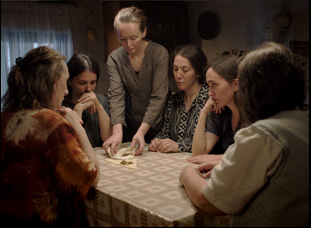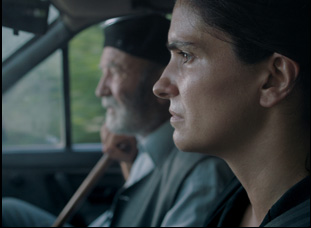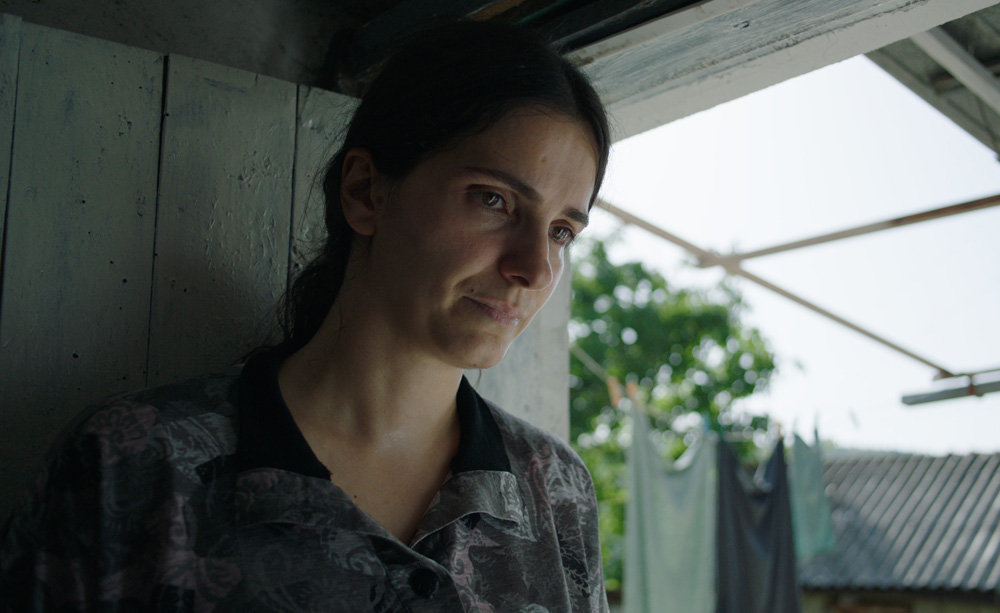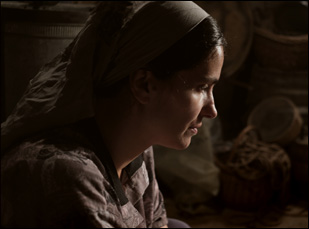If Blerta Basholli had gone into her debut feature “Hive” inspired to tell of the fierce determination of Fahrije Hoti, a remarkable self-made entrepreneur who lifted up her entire community in Kosova with the making of the red pepper paste known as avjar, she would demonstrate plenty of it herself over the near-decade she spent getting it to the screen.
“Making films is not easy anywhere in the world and the story was very touching and emotional and we had to really dig deep into our own emotions,” said Basholli. “I really just wanted to put everything I know and I could into this film in every stage of it – in writing, in preproduction, in production and in post-production, [which] happened partially during the pandemic, and I just didn’t want to think of anything else. I was just going to give everything to it.”
Like Hoti before her, Basholli has seen such dedication pay off when “Hive” won both the Grand Jury Prize and Audience Award for World Cinema at the Sundance Film Fest earlier this year en route to being named Kosova’s official selection for the Oscars, and there could be no better ambassador for the country than the rousing drama in which Fahrije, played by the riveting Yllka Gashi, attempts to forge a future for herself while continuing to be gripped by the past, still clinging to the hope that her husband Agim is alive when so many who died during the civil war at the turn of the century were never identified. Still, with two kids to feed, not to mention her father-in-law, she looks for ways to put food on the table beyond her own, building upon the relative success she’s had at selling honey to start a real business with avjar and enlists the other women in her small town of Krusha to try to break into the supermarket shelves of the big city of Pristina.
When women can only obtain driver’s licenses with the permission of their husbands, there’s far more than miles to overcome in Fahrije’s journey to success, though she clearly has the drive and although “Hive” holds the obvious power of Basholli’s muscular direction and Gashi’s unflinching performance, there’s something to be said for its director making similar rounds as Hoti did in convincing potential financiers the story was worthwhile when international funding was hard to come by and finishing the film as the COVID-19 outbreak was shutting the world down. As emotionally authentic as it is true to its real-life subject, it’s no wonder that “Hive” has resonated so broadly already and with the film arriving in theaters this week, Basholli and Gashi, graciously taking time out from their premiere at the Valladolid Film Fest in Spain, spoke about their ongoing collaboration, which began on the director’s short comedy “Lena dhe Unë” in 2011 and yielded such a strong partnership that they would travel together to meet Hoti even before knowing they’d make a film.
Blerta Basholli: I heard about the story on TV and although I was born and raised in Pristina, Kosova, I was really surprised. As a country, we rarely know about good things and we’ve gone through a lot, first because of the war, but many years of occupation. I tend to sometimes have a lot of satirical moments in my short films, even when I’m dealing with very serious matters, so I wasn’t sure what approach I’d have for it. But I had known Yllka Gashi for a long time because she’s a well-known actress in Kosova and was really lucky to have worked with her on a short film before, so I knew what I could do with an actress like her, and we went to meet together Fahrije. I really understood [then] that this is a really strong woman standing here in front of me, a really different personality from any person I’ve ever met and this has to be a new mission for me for putting this strong character on screen. After I met her, it really became a a character-driven story about a woman [for] whom giving up is never really an option and I was even more sure about casting Yllka.
Yllka, what was meeting Farhije like for you?
Yllka Gashi: It was awesome. I knew her story from before as well [because] she was one of the organizers of the protests that were happening for missing people during the war in Kosova and I also tried her avjar way before meeting her, so I was a customer. When I met her in person, she has this charisma that is so unique and she was very open to giving me the answers to the questions I had. We spent probably four hours with her and she told us so many things, some of them were very hurtful and hard to hear and others were a bit funny. Even though she’s been through so much, she is a strong and funny person and I fell in love with her.
When I met her, I paid a lot of attention to the way she was smoking her cigarettes, and then Blerta and myself, we brainstormed a lot about how we want to portray her. It was very important for us to honor her legacy and what she’s been through and we tried to figure out what was it like to be in her shoes, to live with that uncertainty and that desire to change the status quo that she and her widow friends were going through. Since 2011 to 2019 when we shot the movie, I lived with that idea and that dream to portray her in a film and I had a great director with me and she made things easier.

Blerta Basholli: It actually really changed when I met her in person. When people ask me, was the idea from the beginning to make a feminist film about a strong woman, it was not. I was just amazed at the story and because of the energy [Farhije] was giving to us when we met her, because of the way she spoke about everything – her dreams and how she pursued them and how she never stopped – was like this is not just another project for me. We lack representation of women on screen, but a lot of times when women are represented, they’re a victim, so I really thought this is about a character’s victory and because she was the main driver for everything, I just wanted the audience to connect to the character, rather than have to think oh what a beautiful shot or what a beautiful angle or composition. Because it was based on a true story, very few elements of the film I either exaggerate or are symbolic, and I was like, “Alright, this is not a documentary, but it has to feel real,” and I was really inspired by the Dardenne Brothers’ film “Rosetta,” and I really wanted that feeling [where] the camera was all the time on Fahrije and understand through her what’s going on in the society and everything going on around her.
Farihije is a stoic character – Yllka, was it an exciting challenge for you to work without a lot of dialogue?
Yllka Gashi: Yes, it definitely was. I am a very expressive person – I do talk a lot with my hands and this was something completely different for me. I had to tame my expressiveness very much and I also had to work on the inner feelings, saying a lot with less facial expressions specifically and it was a bit challenging, but I loved it. It was very empowering because this is the first role where I didn’t care how I look. I just cared about being honest in front of camera and sincerely delivering the feelings Farhije was feeling in what was going on inside of her head.
And you had to learn beekeeping…
Yllka Gashi: Yes, we had a guy who is a beekeeper and he sells organic honey – very delicious – and he worked with us to show us how we should approach the bees. During rehearsals, I had so much fun. It was very interesting for me and I didn’t get stung, so I was like, “Look, I can handle this, this is great. I’m good at this. But then when we started to shoot the scenes where I worked with the bees, I made them go crazy – they stung me five or six times. And I didn’t even know if I have allergies, so after Blerta said cut, I said, “Oh, I got stung. Help me. Let’s see if I’m going to get swollen or I’m going to get an allergic reaction or something like that.” [laughs] Thank goodness I didn’t and we shot a few more times, but the bees are amazing, and it was very interesting to work with them.

Yllka Gashi: Yeah, it was special because we went to the Zurich Film Festival, that was my first in-person gathering after the pandemic and being in Pristina, I was born and raised there and have my family there, I live in the U.S. now, but going back home, it’s always welcoming and warm and I had my family there with me. It was a night that I will remember for sure.
Blerta Basholli: Yeah, it was amazing. We were lucky to have Yllka and Farhije there and it’s a different feeling because everyone had gone through the war, so when we were showing it in Pristina, everybody’s connecting immediately. It was very touching and very emotional for everyone because it brings back people to the war times, but also a lot of people are really grateful that we did this film and that we were telling the story of these women.
“Hive” opens on November 5th in New York at Film Forum, November 12th in Los Angeles at the Laemmle Royal, Santa Barbara at the Riviera and Winston-Salem, North Carolina at the Aperture. A full list of theaters and dates is here.





